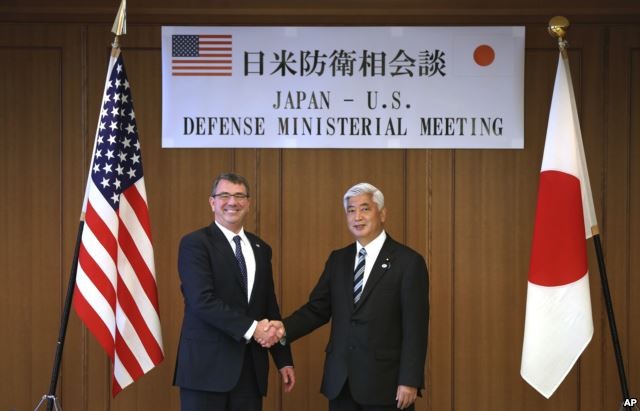(VOVworld)- US Defense Secretary Ashton Carter is on a tour of Japan and the Republic of Korea. This is Mr. Carter’s first overseas trip as Head of the Pentagon demonstrating the US’s defense priority with its allies and its commitment to the Pacific pivot.

U.S. Defense Secretary Ash Carter and Japan's Defense Minister Gen Nakatani prior to a meeting at the Defense Ministry in Tokyo, Wednesday, April 8, 2015.
|
With the emergence of extreme Islamism in Iraq and Syria, the civil war in Yemen and Russia’s intervention into eastern Ukraine, the US realizes that it’s important to reaffirm its position in the Asia-Pacific region, partly through Mr. Carter’s trip to Japan and the Republic of Korea
When he was Deputy Defense Secretary from 2011 to 2013, Mr. Carter strongly supported the US’s pivot to Asia and cited the region’s importance to the US’s future. Before this trip, Carter called Asia the defining region for the US’s future despite ongoing national security concerns around the globe.
Strengthening and modernizing ally relationships
In Japan, Mr. Carter will discuss with Japanese leaders changes in the US-Japan defense cooperation guidelines, which would give the Japanese Self-Defense Forces more power in dealing with Asia’s security issues. Revising the defense guidelines for the first time since 1997 would mark an evolution in the US-Japan defense ties and help Prime Minister Shinzo Abe pass legislation that would give the Self-Defense Forces more power to protect Japan and its allies, and to take part in limited military cooperation overseas. The guidelines will be high on the agenda of the talks between Japanese Prime Minister Shinzo Abe and US President Barack Obama to be held in Washington later this month.
In Seoul, Republic of Korea leaders will receive a strong security recommitment from the US. The two sides will discuss ways to deal with the North Korean issue. Carter will visit the US Pacific Command in Hawaii and attend the Shangri-La Security Conference in Singapore in May. This will be an opportunity for the US to strengthen its ties with Singapore and other Asia-Pacific allies.
Rebalancing the US’s role
The self-proclaimed Islamic State is ravaging Iraq and Syria. Yemen has plunged into a civil war. Iran’s nuclear program has opened conflicts between the US and Israel. Escalating violence in Ukraine is pushing Washington and Moscow away from each other. The jihadist crisis in the Middle East, Africa and Europe is escalating with all these threats, the US is feeling the need to review its security policy.
Having withdrawn its troops from Iraq in 2011 and due to complete troop withdrawal from Afghanistan by the end of this year, the US is attempting to shift its military resources to the Asia Pacific region. But the pivot to Asia is being hampered by defense budget cuts, worsening violence in the Middle East and North Africa and objections from China. During this trip, Mr. Carter has revealed an ambitious plan to increase the US military presence in the Asia-Pacific region to 60% within the next 5 to 10 years. The US Navy will be deployed in the Philippines, Australia, the Republic of Korea, Japan and India. To carry out this plan, the US needs to strengthen its alliance and invest more in weapons including stealth aircraft, long-range strategic bombers and military equipment. The Trans-Pacific Partnership Agreement is also a key to the US maintaining its influence in the region. With China expanding its financial markets and increasing its influence in the region - 35 countries including many US allies have joined the China-initiated Asia Infrastructure Investment Bank- the US must now work harder to expand its trade partnerships.
Mr. Carter’s trip demonstrates the US administration’s commitments to its rebalancing strategy in Asia Pacific. By updating defense ties with its allies and expanding trade cooperation, the US hopes to strengthen its link with Asia-Pacific, a region that holds the key to the world's future security.